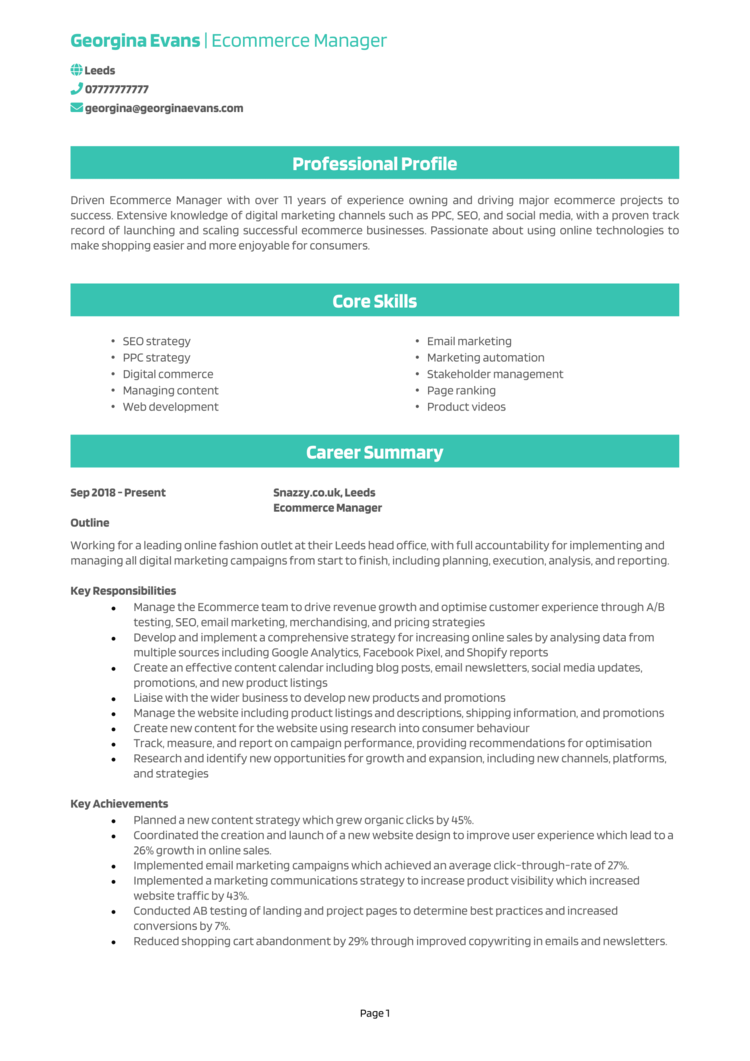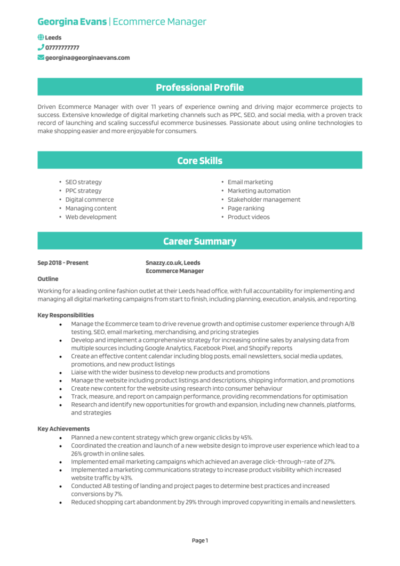You know all there is to know about Ecommerce – but to advance your career, you’ll need a bump in visibility of your own.
Writing your CV might not be as thrilling as split-testing landing pages, but it could be the key to landing that next big role.
This guide and its Ecommerce Manager CV example will help you show your experience and strategic thinking to ensure your application doesn’t get lost in the digital shuffle.
Ecommerce Manager CV

How to write your Ecommerce Manager CV
Discover how to craft a winning Ecommerce Manager CV that lands interviews with this simple step-by-step guide.
As an Ecommerce Manager, you know the power of a seamless user journey – and your CV should deliver exactly that. This guide covers everything about writing a CV that highlights your online retail expertise.
Whether you’ve worked on high-growth Shopify sites or led multi-channel campaigns for global retailers, this step-by-step guide will help you showcase your skills in a way that clicks with employers.
What’s the right way to structure and format your Ecommerce Manager CV?


A disorganised CV won’t convert – it’s as simple as that. To make a great first impression, your CV needs to be logically laid out and easy to scan for impact. Recruiters should be able to see your digital skills, commercial achievements, and Ecommerce tools experience without effort: hiding them behind a messy structure and visual mistakes will just force them onto the next applicant.
Here’s the layout to follow:
- Name and contact details – Place your name and personal details prominently at the top of your CV for quick access. Adding a photo is up to you.
- Profile – Open with a compelling overview of your skills, experience, and career goals.
- Core skills – List your key abilities in this section, focusing on those that will be most relevant to the job.
- Work experience – Provide a detailed breakdown of your work history, starting with the most recent job first.
- Education – List your qualifications, including degrees and relevant certifications, in reverse chronological order.
- Additional info – Use this optional space for relevant hobbies or personal pursuits that enhance your application.
Use bullet points in each section to break up dense text and make your contributions stand out. Stick to a consistent font style, use clear headings to divide sections, and limit the CV to two pages long. A strong format shows you understand digital presentation – and makes it easier for hiring managers to convert your application into an interview.
How to create an Ecommerce Manager CV profile


Your CV profile sits right at the top of your application and acts as your professional pitch – a snapshot of your experience, skills, and the commercial results you’ve delivered. It’s your chance to sell your value to a hiring manager in just a few lines.
Think of this paragraph like a headline banner: it should be attention-grabbing and geared toward the reader’s needs. Focus on what you can offer them – not just what you’ve done, so they understand at a glance the kind of value you’ll bring to their company.
Ecommerce Manager CV profile examples
Profile 1
Experienced Ecommerce Manager with over 10 years leading online retail operations across fashion and lifestyle brands. Proven track record in scaling DTC channels, optimising conversion rates, and managing end-to-end ecommerce platforms. Skilled in Shopify Plus, SEO strategy, and digital merchandising.
Profile 2
Results-oriented Ecommerce Manager with eight years of experience in FMCG and health sectors. Specialises in driving sales growth through CRO, digital advertising, and customer journey optimisation. Confident using tools such as Google Analytics, Magento, and Klaviyo to deliver insight-led improvements.
Profile 3
Commercially driven Ecommerce Manager with five years of experience managing multichannel online stores for SME retailers. Adept at product uploads, onsite content management, and coordinating paid media strategies. Known for improving site performance and managing stakeholder relationships across marketing, tech, and logistics.
Details to put in your Ecommerce Manager CV profile
Include the following:
- Where you worked – Briefly outline the type of companies you’ve worked for to show whether you’re experienced in fast-paced startups, large retailers, agencies, or D2C brands.
- Your top qualifications – Mention relevant degrees, diplomas, or Ecommerce-specific certifications to demonstrate your technical and commercial knowledge.
- Essential skills – Highlight your core Ecommerce strengths such as online merchandising, conversion rate optimisation, or marketplace strategy.
- Specialisms or channels – State whether you’ve worked across Amazon, eBay, Shopify, Magento, or other specific platforms or fulfilment models.
- Value delivered – Outline the results of your work – whether that’s revenue growth, customer retention, or improved campaign performance.
Presenting your core skills


This section should zero in on technical and commercial skills that align with the Ecommerce manager role. Recruiters want to see clear evidence of platform expertise and campaign management – not vague soft skills or filler.
Focus on things like CRO, PPC campaign oversight, online trading, SEO for product listings, and analytics tools like Google Analytics or Data Studio. Include mention of experience with Ecommerce platforms and CMSs: it’s what recruiters are hoping to see. Match your CV skills to the requirements in the job description to ensure your CV is seen as highly relevant.
Essential skills that recruiters look for in an Ecommerce Manager CV
- Online Sales Strategy Development – Creating and executing strategies to drive traffic, increase conversions, and grow online revenue.
- Ecommerce Platform Management – Overseeing daily operations of platforms such as Shopify, Magento, or WooCommerce to ensure seamless user experience.
- Digital Merchandising and Product Listings – Managing product catalogues, descriptions, pricing, and promotions to optimise sales performance.
- Data Analytics and Performance Monitoring – Using tools like Google Analytics to track KPIs, user behaviour, and campaign effectiveness.
- SEO and Content Optimisation – Improving product visibility and organic rankings through keyword strategies, on-page SEO, and content updates.
- Conversion Rate Optimisation (CRO) – Testing and refining website elements such as layout, checkout flow, and calls to action to increase conversion rates.
- Inventory and Order Management Coordination – Ensuring stock levels, fulfilment processes, and shipping logistics are aligned with customer demand.
- Email Marketing and CRM Integration – Designing and managing email campaigns to engage customers and drive repeat business.
- Marketplace and Channel Expansion – Managing listings and performance on platforms like Amazon, eBay, or social commerce channels.
- Team Leadership and Cross-Department Collaboration – Coordinating with marketing, IT, and customer service teams to support business goals and digital initiatives.
How to highlight work experience


Here’s where you prove you can do the job – not just talk about it. Your work experienc section should walk employers through your most recent and relevant roles, showing how your input translated into performance improvements.
List your jobs in reverse chronological order. For each role, start with a short overview of the business and your position in it, then use bullet points to describe your day-to-day responsibilities and measurable achievements. Mention the channels, platforms, or tools you worked with – and don’t shy away from data.
Focus on what you helped the business achieve, whether that was launching a new storefront, increasing basket size, or optimising the checkout flow.
How to make your past experience easy to read for employers

- Outline – Describe the company you worked for and the scale of its Ecommerce operation. Include what department you sat within and who you reported to.
- Responsibilities – Use action words like “optimised” and “launched.” For example: “optimised mobile experience to improve conversion rate” or “launched new subscription model across international storefronts.” Include platforms and processes where relevant.
- Achievements – Showcase results: improvements in KPIs like AOV, bounce rate, repeat customer percentage, or revenue per session. Include figures where possible.
Example job entries for Ecommerce Managers
Ecommerce Manager | Novare Homeware Ltd
Outline
Managed all ecommerce operations for a luxury homeware brand, overseeing site content, marketing campaigns, and customer experience across Shopify Plus platform.
Responsibilities
- Updated product listings, category pages, and promotional banners using CMS
- Monitored daily site performance and resolved technical issues with developers
- Planned and executed seasonal campaigns in coordination with digital marketing
- Created product upload templates and managed stock syncing with warehouse
- Used GA4 and Hotjar to analyse user behaviour and inform CRO improvements
Achievements
- Increased site conversion rate from 1.9% to 2.8% over 12 months
- Reduced bounce rate by 22% after homepage redesign
- Drove a 34% uplift in email-driven revenue via segmented Klaviyo flows
Ecommerce Manager | Raxon Activewear
Outline
Oversaw the digital retail channel for a performance clothing brand, managing online sales strategy, paid acquisition, and customer retention initiatives.
Responsibilities
- Led ecommerce calendar planning, including sale events and new product launches
- Managed SEO improvements and coordinated PPC and paid social with agencies
- Produced monthly performance reports and provided insights to senior leadership
- Maintained merchandising standards and ensured accurate inventory across SKUs
- Integrated reviews, loyalty schemes, and upsell features into the customer journey
Achievements
- Grew ecommerce revenue by 52% year-on-year through targeted campaign planning
- Achieved 8x ROAS on Black Friday paid search campaign
- Improved average order value by 18% using cross-sell and bundle strategies
Ecommerce Manager | Curo Nutrition Group
Outline
Directed ecommerce performance for a fast-growing supplements company, supporting DTC growth and Amazon marketplace optimisation.
Responsibilities
- Managed listings, pricing, and content across Shopify, Amazon, and eBay
- Optimised PDPs for SEO and conversion using keyword research and A/B testing
- Analysed customer data to identify trends and inform remarketing campaigns
- Worked with supply chain team to ensure fulfilment SLAs and stock forecasting
- Developed dashboards in Looker Studio to track KPIs and campaign results
Achievements
- Increased Amazon sales by 47% after restructuring product titles and descriptions
- Reduced cart abandonment by 25% with improved checkout UX
- Launched subscription model contributing to 30% of monthly recurring revenue
Education and qualifications


Your educational background may not need to dominate the CV, but it can still add credibility – especially if you’ve studied subjects like Business, Marketing, Digital Media, or Data Analytics.
List your most recent qualification first. That might be a degree, diploma, or even a short course that’s directly relevant to the role. Include it even if your path into Ecommerce was unconventional – experience often matters more, but education adds that layer of professionalism and structure.
Qualifications recruiters look for in an Ecommerce Manager
- BA/BSc in Marketing, Business, or Digital Media – Gives a solid commercial and strategic foundation
- Google Analytics Certification – Demonstrates competency with one of the most essential analytics tools in Ecommerce
- Chartered Institute of Marketing (CIM) Digital Marketing Diploma – Industry-recognised qualification for digital strategy
- Shopify or Magento Platform Certification – Shows technical proficiency with key Ecommerce platforms
- Conversion Rate Optimisation (CRO) Certification – Confirms your ability to identify bottlenecks and improve on-site performance





